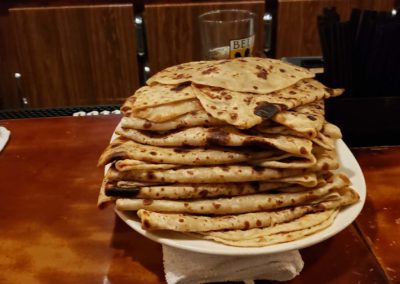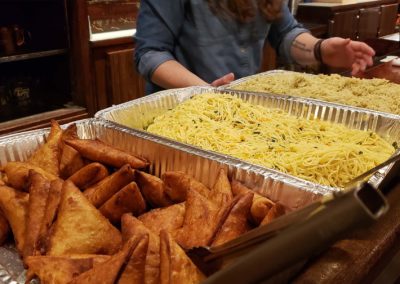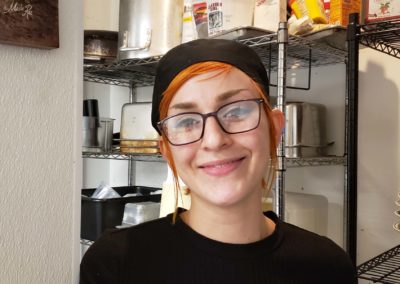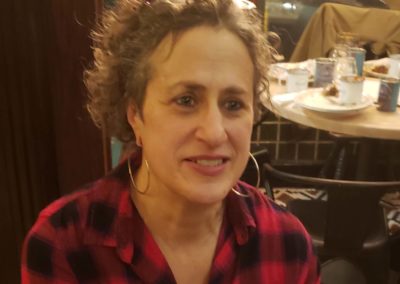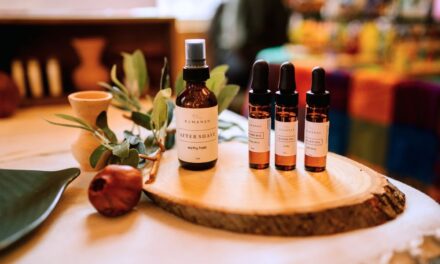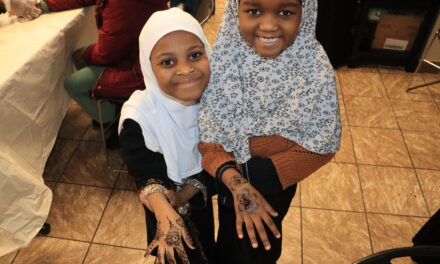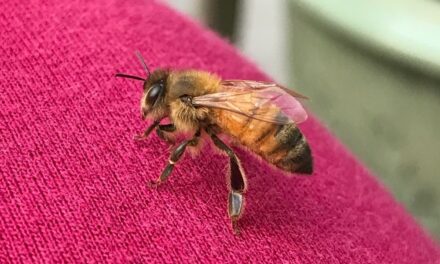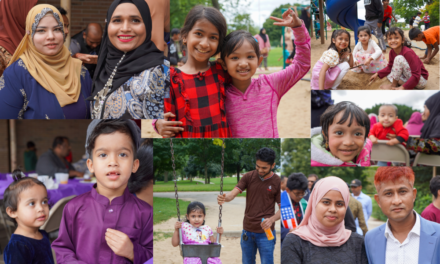A small group of ladies stands by the bar in the middle of a roomful of hungry people. A Somali lady wearing a white dress with black polka dots is saying, “I make chicken and goat meat.” But Sumeya Osman is simply translating for the woman standing next to her. She adds, “If you went to the Congolese food, it’s similar.”
Osman refers to another pop-up dinner sponsored by Tables Across Borders earlier this year. Tonight’s dinner is being held at the Tandem on Fond du Lac Avenue in the Lindsey Heights neighborhood. Large pans of food have already been placed on the marble bar, and even more is being brought out. The Tandem employees and relatives of the Somali chefs hover around, ready to serve.
While the diners line up with their plates, the chefs take a break in the back room. They’ve been here at the Tandem cooking for the past two days.
Sarah (not her real name), 42, came here from a refugee camp in Ethiopia, where she spent 9 years. She has been in Milwaukee for three and a half years. Dressed in an iridescent light-blue scarf and flowing print dress, she is friendly and kind. She tells her story through Sundus, the daughter of the other chef, who translates while Sumeya Osman is behind the bar serving food.
Sarah describes a situation that is all too common in Somalia, a failed state ruled by warring militias. Her mother and brother, she says, “were attacked.” Sarah’s mother was killed; her brother shot and left brain damaged. Somehow, she managed to bring him here to Milwaukee.
A home cook, Sarah has no ambition to be a professional, but she is obviously used to cooking for large groups. She and her partner for the evening, Halimo Geal, made generous amounts of food. Sarah made the sambusas and big pans of thin noodles and macaroni with meat and vegetables, and a rich, creamy soup with a tomato base. Most of the noodle dishes contain meat, the steak and chicken dishes are made with onions and tomatoes and other vegetables. Some wonderful thin crepes are light and fluffy. The sambusas, stuffed with ground beef and onion are excellent, crisp on the outside and well-seasoned on the inside.
Halimo Geal, 36 works at Clara Mohammed School in Milwaukee as a cook, cleaner, and “watching the kids.” Her daughter Sundus came to Milwaukee as a two-year-old and is now 11 and helping out tonight. Besides the goat and chicken, she made various kinds of rice, couscous (pearled), and sorh, a type of corn grits that looks a little like mashed potatoes, and the pans of cut-up melon.
She and Sarah are both from Mogadishu, though they met in Milwaukee. When you ask the ladies what things were like in Somalia, they shrug and say, “War.”
Caitlin Cullen, the Tandem’s chef and owner, explains how it works with the food. The restaurants donate some of the food. UWM donated funds. Caitlin and the ladies went grocery shopping together at Restaurant Depot, where they bought the halal chicken and beef. The goat, along with chilis and noodles, was from the Somali grocery at 1011 S. Mitchell Street.
The Tandem, which is one of three restaurants involved in the Tables Across Borders program, gets to keep the bar revenues for the evening. As Caitlin Cullen says, that’s how the restaurants “keep the lights turned on. It’s a separate ticket,” Cullen says. Many of the refugees are Muslim and don’t consume alcohol and won’t take money mixed from the sale of alcohol.
The ticket cost for each of the refugee-chef dinners is $60 per person, and tickets sell out within 24-48 hours, said Kai Gardner Mishlove, founder and guiding spirit of Tables Across Borders. Tables has been sponsoring these pop-up restaurants, each with a different pair of chefs from one of Milwaukee’s resettled refugee communities, since last January. “This shows you how much communities want to connect,” she said at The Tandem on Monday night. “The support has been overwhelming.”
Every chair at every table in The Tandem was taken, an unusual sign of life in the storefront restaurant on a Monday night in an otherwise quiet neighborhood. As with all of the Tables Across Borders events, proceeds from ticket sales go to the refugee chefs.
Sumeya Osman works with Kai at her day job at the Walker’s Point Community Clinic. Osman has been in Milwaukee for only three years. Before that she was an “urban refugee” in Kampala, Uganda for 6 years. Osman says she would like to go back to Africa, to either Somalia or Uganda. “I want to go back and see my home and give back to my community,” she said.
Many of the guests, like Amy Schnabel, are engaged with refugees in one way or another. On breaks from her job doing restorative justice work with ACS Clinical Services, Schnabel visits refugee camps on the Greek Island of Lesbos. Rona Wolfe engages along with her kindergarten class at Milwaukee Jewish Day School. Her charges and a group of refugee children their own age have “played together and had an amazing experience,” Wolfe said. Lenny Kass, Milwaukee Jewish Day School gym teacher and camp director, has been taking the children to Rainbow Camp together every summer for the past three years.
Also in attendance, students from Rachel Buff’s Immigration and Refugee Policy class at UWM: Mia Knops, Dean DeVoe, Jesus Velarde, Corey Anderson, all freshman, who were so efficient and helpful that they whisked around the room like speeded up super-heroes. I found them taking a short break when the diners were still busy eating.
Dr. Rachel Buff is the director of Cultures and Communities at UWM, the program that donated the cost of some of the food the Somali cooks prepared in such abundance. “The mission of Cultures and Communities is to be the community-facing part of Letters & Science,” Buff said. While community engagement programs are now a trend for urban campuses like UWM, “Our program is 17 years old,” she said. “At UWM, students can do a coherent set of courses on community engagement and multi-cultural studies to fulfill their general ed requirements. They do service learning as part of the program.” This nicely designed set of requirements is another way Milwaukee communities have of reaching out and getting comfortable with each other.
Thanks to the hub of Walker’s Point Community Clinic and people like Kai and her network, the refugee community in Milwaukee has been given a warm welcome, even as the number of refugees allowed entry has been dramatically reduced. Two young people from Public Allies, a division of AmeriCorps, are working at Walker’s Point Clinic, where they are managed by Kai. Max Levy, 24, and Aditi Narayan, 23, set up educational programs for refugees. Currently, they’re implementing a winter preparedness program that teaches refugees from hot countries how to dress in Wisconsin winters and how to winter-proof their residences. There have been a couple of cases of frostbite. But as guests mill around at the end of the evening, some taking home cardboard cartons of extra food, it’s clear that this is a family affair. And families take care of their own.


